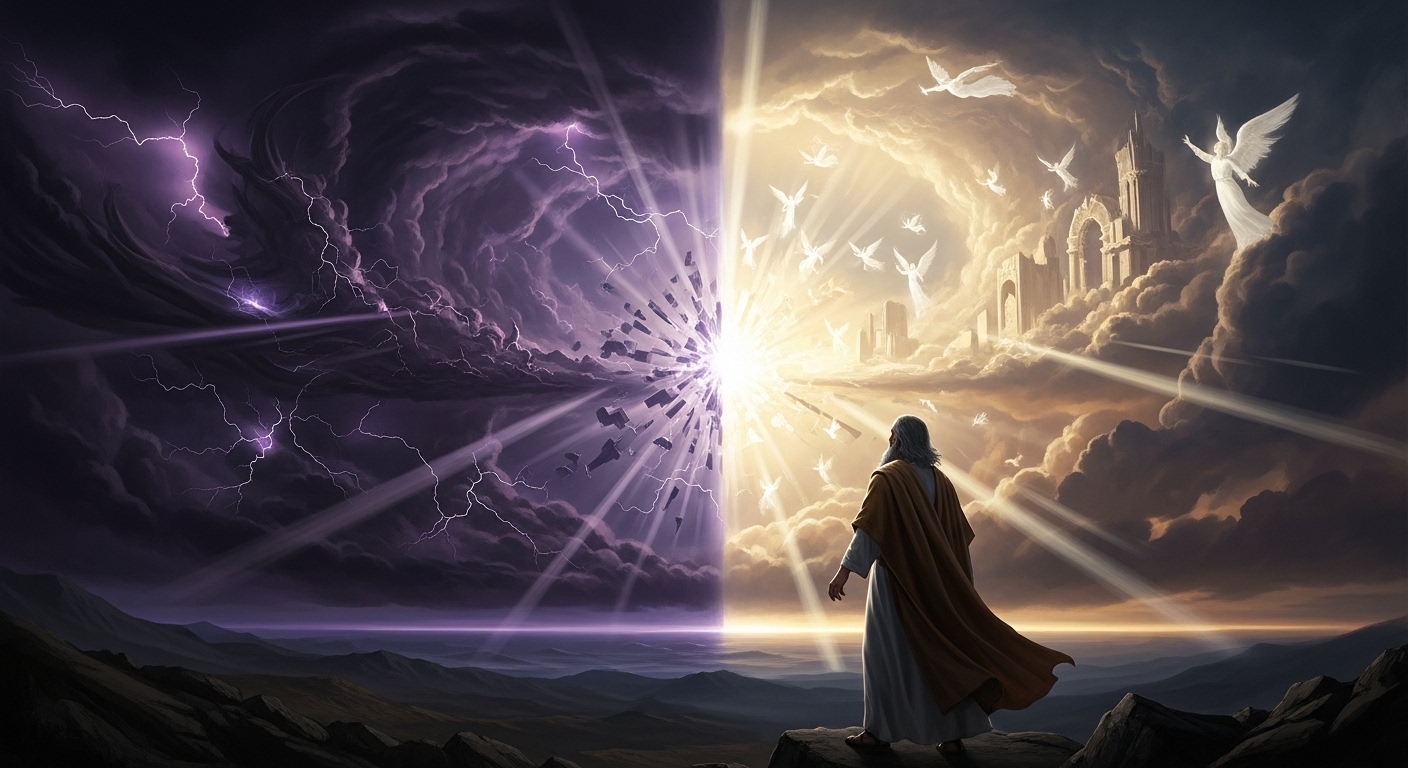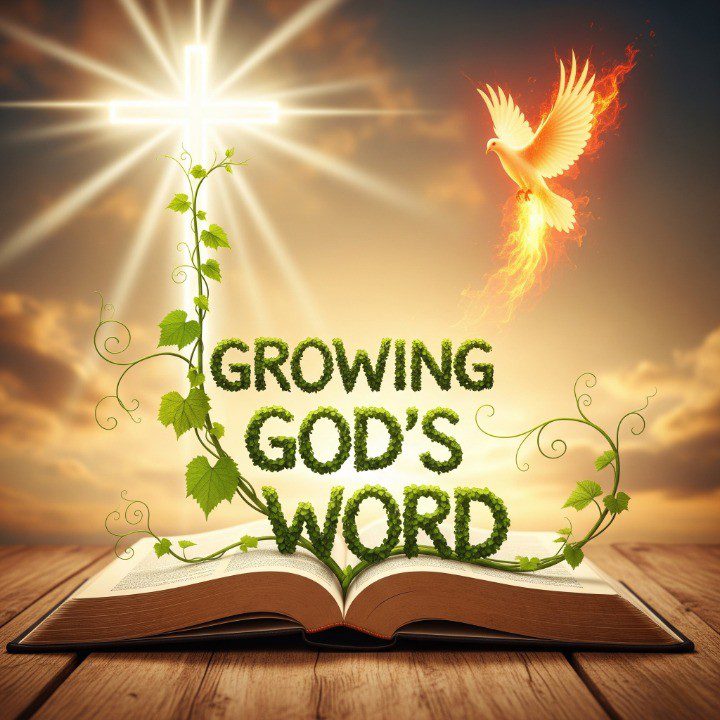Have you ever felt completely undone, stripped bare by a sudden realization of your own inadequacy? The prophet Isaiah did. In a moment of national crisis, he experienced a vision that shattered his self-perception and launched him into a life of prophetic ministry. Let’s explore this transformative encounter and uncover the profound truths it reveals about God’s holiness and our own need for divine grace.
A Kingdom in Crisis: The Year King Uzziah Died
The people of Israel were in mourning. King Uzziah, a ruler remembered for his godliness and prosperity, had passed away. His reign, though marred by a tragic end due to his arrogance, represented a golden age. This loss created a sense of uncertainty and vulnerability. It was in this context of national grief that Isaiah received a vision that would forever change his life.
Seeing the Lord: A Vision of Sovereign Majesty
Isaiah writes, “In the year that King Uzziah died I saw the Lord.” But this wasn’t just any lord; it was Adonai, the Sovereign One, seated on a throne, high and lifted up. The text subtly distinguishes between “Lord” (Adonai – title) and “LORD” (Yahweh – God’s sacred name). This distinction highlights the supreme authority and majesty of God.
- The Throne and the Robe: Isaiah sees God seated on a throne, a symbol of absolute power. The train of His robe filled the entire temple, signifying His boundless glory and dominion. Imagine the coronation of a queen, but amplified to a cosmic scale.
- A Christophany?: Some believe this vision to be a Christophany, an Old Testament appearance of Jesus as Lord.
The Seraphim: Guardians of Holiness
Above God stood the Seraphim, angelic beings with six wings. Their very anatomy speaks volumes about the environment they inhabit: the immediate presence of God.
- Covering Their Faces: With two wings, they covered their faces, shielding themselves from the blinding glory of God’s presence. Even angels cannot gaze directly upon His unfiltered radiance.
- Covering Their Feet: Two more wings covered their feet, acknowledging their creatureliness and humility before the divine. Even in heaven, there is a recognition of the vast difference between Creator and creation.
- The Message Matters Most: While their anatomy is fascinating, it is their message that is truly significant.
Holy, Holy, Holy
“Holy, Holy, Holy”: The Song of the Seraphim
The Seraphim cried out to one another, “Holy, holy, holy is the Lord of Hosts; the whole earth is full of his glory!” This threefold repetition of “holy” is no accident.
- Emphasis Through Repetition: In Hebrew literary tradition, repetition emphasizes importance. Saying something twice is like saying, “Listen carefully!”
- The Superlative Degree: But saying something three times elevates it to the superlative degree. God isn’t just holy; He is holy, holy, holy! This highlights the absolute, unparalleled purity and perfection of God.
- The Earth is Full of His Glory: The angels proclaim that the earth is full of God’s glory, but often we are blind to it. We are like people in a magnificent theater wearing blindfolds.
“Woe is Me!”: Isaiah’s Confrontation with His Own Sinfulness
Encountering God’s holiness had a profound effect on Isaiah. He cried out, “Woe is me! For I am lost; for I am a man of unclean lips, and I dwell in the midst of a people of unclean lips; for my eyes have seen the King, the Lord of Hosts!”
- From Self-Confidence to Despair: Before this vision, Isaiah likely possessed a strong sense of self. But seeing God’s holiness revealed the depth of his own sinfulness.
- A Divine Oracle Reversed: Isaiah, instead of pronouncing God’s curse on others, pronounces it on himself.
- Understanding God, Understanding Self: In that moment, Isaiah truly understood who God was, and consequently, who he was.
Cleansing and Commission: A Call to Service
God didn’t leave Isaiah in his despair. One of the Seraphim touched his lips with a burning coal from the altar, saying, “Behold, this has touched your lips; your guilt is taken away, and your sin atoned for.”
- Cauterizing and Cleansing: The burning coal, though painful, cleansed and healed Isaiah’s lips, symbolizing the removal of his sin.
- “Whom Shall I Send?”: Then, Isaiah heard the voice of the Lord asking, “Whom shall I send, and who will go for us?”
- “Here Am I, Send Me”: Cleansed and transformed, Isaiah responded without hesitation: “Here am I, send me.”
The Divine and Supernatural Light: Seeing Truth, Beauty, and Glory
This encounter highlights the transformative power of encountering God’s holiness. As Jonathan Edwards described it, it’s like receiving a “divine and supernatural light” that illuminates our souls.
- Seeing the Truth: This light allows us to see the truth of God’s Word.
- Seeing the Beauty: It reveals the beauty of God and His Word, even in the midst of challenging truths.
- Seeing the Glory: It persuades us of the glory of God, His weightiness, majesty, and supreme worth.

God is Majesty – God is Supreme
We are but Dust
Conclusion: A Call to Encounter God’s Holiness
Isaiah’s vision offers a powerful reminder of the importance of encountering God’s holiness. It’s a process that can be both terrifying and transformative, leading us to a deeper understanding of ourselves and a greater desire to serve Him. Are you ready to step out of the shadows and into the light of God’s glory?
Consider this:
- Take time to reflect on your own understanding of God’s holiness.
- Pray for a deeper revelation of His character.
- Ask God to cleanse you from sin and use you for His purposes.
What was the significance of Isaiah’s vision in the year King Uzziah died?
Isaiah’s vision occurred during a time of national grief after King Uzziah’s death. This vision marked Isaiah’s call to be a prophet and profoundly changed him and those influenced by his ministry. The vision contrasts the earthly king’s death with the vision of Adonai, the supreme King. It was also the moment Isaiah understood who God was and, simultaneously, who he himself was in relation to God’s holiness.
What is the difference between the two spellings of ‘Lord’ in Isaiah 6, and what do they signify?
The two spellings of ‘Lord’ represent different Hebrew words. Capital LORD signifies ‘Yahweh,’ the sacred name of God, meaning ‘I AM WHO I AM.’ Lord represents ‘Adonai,’ a title for God meaning ‘Sovereign One,’ also applied to Jesus as ‘Kurios’ in Greek This distinction highlights God’s sovereign authority and sacred name.
Why do the Seraphim have six wings, and what is the purpose of each set?
The Seraphim have six wings designed for their environment in God’s presence. Two wings cover their faces to shield them from the intense glory of God’s presence. Two wings cover their feet, representing their creatureliness and humility before God’s holiness. The remaining two wings are used for flight.
What is the significance of the Seraphim’s song, ‘Holy, holy, holy,’ and why is this repetition important?
The Seraphim sing ‘Holy, holy, holy’ to emphasize God’s supreme holiness. Repetition was a Hebraic literary device to communicate emphasis. The threefold repetition elevates God’s holiness to the superlative degree, unlike other attributes which are not repeated in the same way. The song also declares that the whole earth is full of His glory.
According to the message, what does the divine and supernatural light do when it enters a person’s life?
The divine and supernatural light, as discussed by Jonathan Edwards, awakens individuals and moves them from darkness into light. It is a supernatural life that invades souls and quickens them from spiritual death to spiritual life. It reveals the truth of God’s Word, shows the beauty of the truth, and persuades individuals of the glory and weightiness of God. This light opens eyes, allowing individuals to see the truth and come out of darkness.
Listen to R.C. Sproul’s powerful, God honoring message below. I can assure you that once you have heard this message you will be “in awe of God” our amazing Father, Lord, and Saviour.
Study section:
What passage of Scripture is the speaker referencing?
A: The speaker is referencing Isaiah chapter 6, verses 1-11, which describes Isaiah’s vision of the Lord.
In what year did Isaiah have his vision?
A: Isaiah had his vision in the year that King Uzziah died.
What is the significance of the different spellings of “Lord” in the text?
A: The different spellings of “Lord” indicate different Hebrew words. Capital L, capital O, capital R, capital D represents the sacred name of God, ‘Yahweh’ (‘I AM WHO I AM’). Capital L, little o, little r, little d represents the title for God, ‘Adon’ or ‘Adonai,’ meaning ‘Sovereign One.’
What was King Uzziah known for?
A: King Uzziah was known for his godliness (initially), his innovations, expanding the borders, and building the infrastructure of the nation, leading to prosperity. However, his final days were marked by shame when he tried to take on the role of the priests and was struck with leprosy.
What did Isaiah see in his vision?
A: Isaiah saw the Lord (Adonai) sitting upon a throne, high and lifted up, with the train of his robe filling the temple. He also saw Seraphim standing above Him, each with six wings.
What did the Seraphim do with their six wings?
A: The Seraphim used two wings to cover their faces, two wings to cover their feet, and two wings to fly.
What was the song of the Seraphim?
A: The Seraphim sang, “Holy, holy, holy is the Lord of Hosts. The whole earth is full of his glory.”
What was Isaiah’s reaction to seeing the Lord?
A: Isaiah’s reaction was to cry out, “Woe is me, for I am lost; for I am a man of unclean lips, and I dwell in the midst of a people of unclean lips; for my eyes have seen the King, the Lord of Hosts!”
How was Isaiah’s sin atoned for?
A: One of the Seraphim flew to Isaiah with a burning coal taken from the altar and touched his mouth, saying, “Behold, this has touched your lips; your guilt is taken away, and your sin atoned for.”
What question did the Lord ask after Isaiah’s cleansing?
A: The Lord asked, “Whom shall I send, and who will go for us?”
What was Isaiah’s response to the Lord’s question?
A: Isaiah responded, “Here I am, send me.”
What is the significance of the threefold repetition of “Holy” in the Seraphim’s song?
A: The threefold repetition of “Holy” is a Hebraic literary device to communicate emphasis to the superlative degree, exalting the character of God to the supreme degree.
What is the “divine and supernatural light” mentioned in the context of Jonathan Edwards’ sermon?
A: The “divine and supernatural light” is the awakening by God the Holy Spirit that moves people from darkness into light, not a natural light but a supernatural and divine one immediately imparted to the soul.
According to Edwards, what does the divine and supernatural light reveal?
A: According to Edwards, the divine and supernatural light reveals the truth of the Word of God, the beauty of the truth, and the glory of God.
Read Here Jonathan Edwards Sermon – A Divine and Supernatural Light “Veritas et Lux” –
Post Tenebras Lux
After darkness, light

